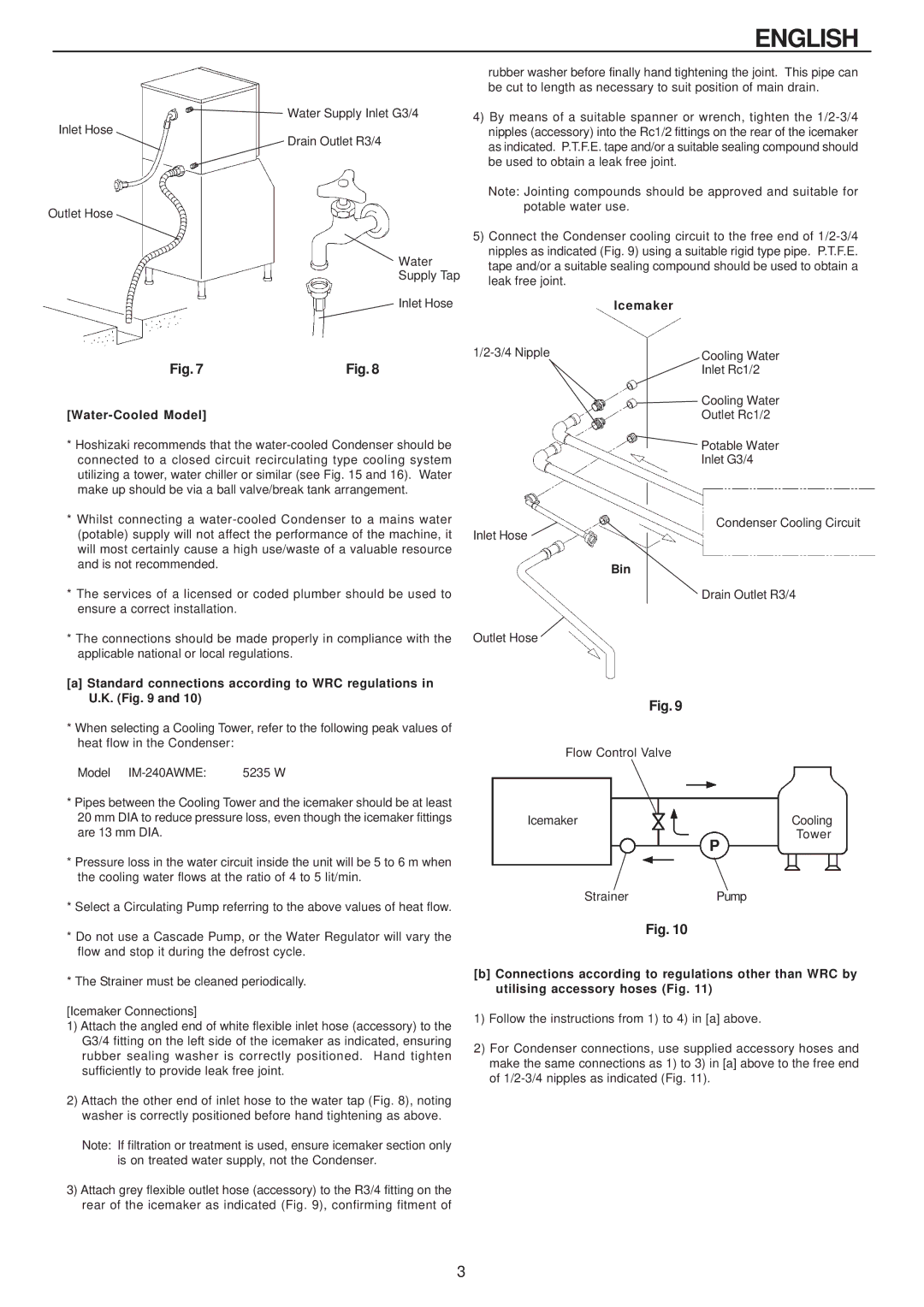
ENGLISH
Inlet Hose | Water Supply Inlet G3/4 | |
Drain Outlet R3/4 | ||
|
Outlet Hose
Water
Supply Tap
Inlet Hose
Fig. 7 | Fig. 8 |
[Water-Cooled Model]
*Hoshizaki recommends that the
*Whilst connecting a
*The services of a licensed or coded plumber should be used to ensure a correct installation.
*The connections should be made properly in compliance with the applicable national or local regulations.
[a]Standard connections according to WRC regulations in U.K. (Fig. 9 and 10)
*When selecting a Cooling Tower, refer to the following peak values of heat flow in the Condenser:
Model | 5235 W |
*Pipes between the Cooling Tower and the icemaker should be at least 20 mm DIA to reduce pressure loss, even though the icemaker fittings are 13 mm DIA.
*Pressure loss in the water circuit inside the unit will be 5 to 6 m when the cooling water flows at the ratio of 4 to 5 lit/min.
*Select a Circulating Pump referring to the above values of heat flow.
*Do not use a Cascade Pump, or the Water Regulator will vary the flow and stop it during the defrost cycle.
*The Strainer must be cleaned periodically.
[Icemaker Connections]
1) Attach the angled end of white flexible inlet hose (accessory) to the G3/4 fitting on the left side of the icemaker as indicated, ensuring rubber sealing washer is correctly positioned. Hand tighten sufficiently to provide leak free joint.
2) Attach the other end of inlet hose to the water tap (Fig. 8), noting washer is correctly positioned before hand tightening as above.
Note: If filtration or treatment is used, ensure icemaker section only is on treated water supply, not the Condenser.
3) Attach grey flexible outlet hose (accessory) to the R3/4 fitting on the rear of the icemaker as indicated (Fig. 9), confirming fitment of
rubber washer before finally hand tightening the joint. This pipe can be cut to length as necessary to suit position of main drain.
4)By means of a suitable spanner or wrench, tighten the
Note: Jointing compounds should be approved and suitable for potable water use.
5)Connect the Condenser cooling circuit to the free end of
| Icemaker |
Cooling Water | |
| Inlet Rc1/2 |
| Cooling Water |
| Outlet Rc1/2 |
| Potable Water |
| Inlet G3/4 |
Inlet Hose | Condenser Cooling Circuit |
| |
| Bin |
| Drain Outlet R3/4 |
Outlet Hose |
|
Fig. 9
Flow Control Valve
Icemaker |
| Cooling |
| P | Tower |
|
| |
Strainer | Pump |
|
| Fig. 10 |
|
[b]Connections according to regulations other than WRC by utilising accessory hoses (Fig. 11)
1)Follow the instructions from 1) to 4) in [a] above.
2)For Condenser connections, use supplied accessory hoses and make the same connections as 1) to 3) in [a] above to the free end of
3
